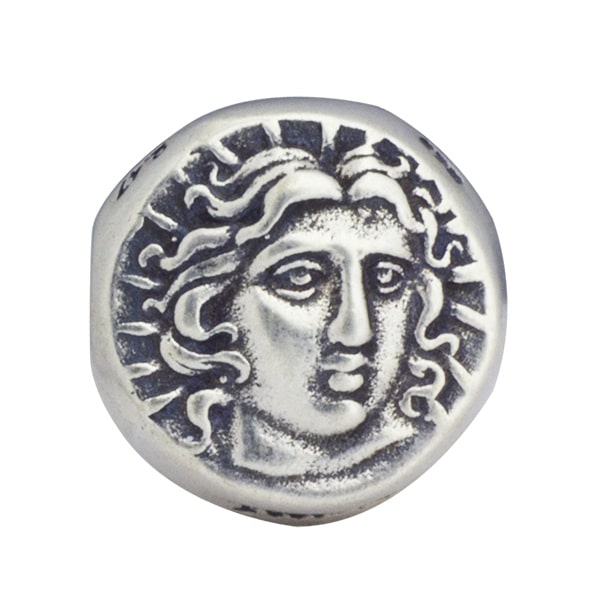Apollon coin
€65.00
In Greek mythology, Apollon is the god of music and poetry, medicine, divination and archery.
Handcrafted in Sterling silver 925 at our workshop in Athens.
| Material | Sterling silver 925 |
|---|
Description
Apollon, in Greek mythology the god of music and poetry, medicine, divination and archery; son of Leto and Zeus, the father of Asclepius. Apollo is one of the most complex Greek deities. He is also the most “Greek” of the Olympian gods and the male ideal, both in physical beauty and strength in intellectual and artistic abilities. Apollo is the Muses captain, he is a master of archery and in strict games on the lyre, he has received from Hermes, as his sister Artemis, he can hit people with his illness arrows. Apollon jealously guarded in all his skills, which myths of Niobe and Marsyas shows. Above all, however, the god Apollo, who can predict the future in its oracles ( in Delphi, Klaros, Didyma ). In Delphi had Apollo first killed Python, the terrible serpent or dragon, who ruled the oracle site. Dragon slaying as a motif known from many religions, in Delphi match was the symbol of the new god, whose invincible forces made him the oracle master. In this role, he carried the nickname Loxias’ The hull’. His oracle played an important role in Greeks colony founding and his cult existed in all Greek cities. Nicknamed Foibos (Latin Phoebus ) is interpreted commonly as ‘the brilliant’, ‘The dazzling’, ‘The one who cleans’. Apollo appears in some myths (Orestes) as the god who joins a genus feud and he stands as the symbol of a new social order based on the rule of law. Apollon perceived (especially later in antiquity) as the god of light and was often made with halo (Helios). In Roman imperial times he was identified with the Sun (Sol Invictus). Apollo’s sacred tree is bay laurel (Daphne), whose branches therefore once used to honour wreaths for poets and musicians. His many and nothing but unhappy love affairs are remarkable: the myths about Dafne, Hyacinthus, Koronis and Kassandra. Apollo raised according to mythology away from Delphi in the winter and was replaced by Dionysos, a deeper contrast between the two gods and their influence on the human mind is already expressed in Euripides’ tragedy Bacchae, see also Apollonian – Dionysian. Apollo’s origins as a deity and the meaning of his name are disputed, in the Iliad’s Apollo on the Trojans’ performance, and according to some theories derived his from Asia Minor, according to others, he is originally from northwestern Greece. Old cult titles (eg Mark Muse, Wolves and Grasshopper Killer) shows Apollo as a shepherd and vegetation god, but from archaic times, his intellectual side was the main.



